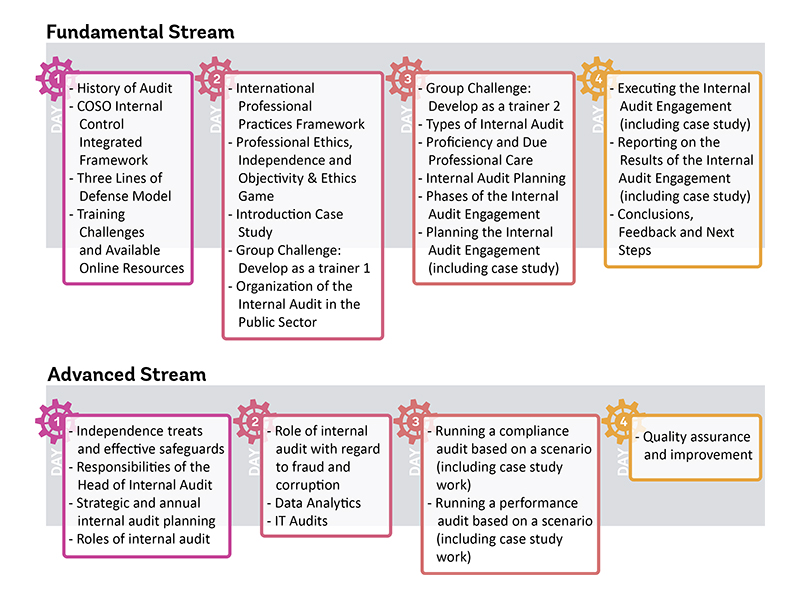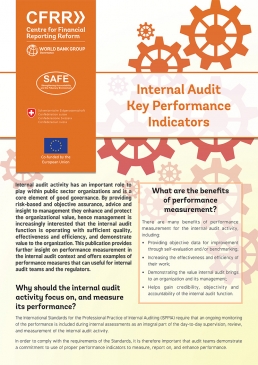The Internal Audit Training of Trainers (IA ToT) activities aim to develop the capacity of public sector internal auditors to deliver high-quality internal audit training within their countries and institutions, based on the International Standards for the Professional Practice of Internal Auditing (ISPPIA) and international good practices in public sector internal auditing.
The target participant group are auditors in the public sector who already have skills in internal auditing, and also professionals extensively involved in training delivery in their respective countries and institutions. The approach and format of the IA ToT program is designed to be highly interactive and includes:
The activities of the program are designed at 3 levels:
- #1: Regional capacity building:
Community of Practice (CoP) approach with participants engaging in training through workshops and online modules. The workshops aim to develop the capacity of public sector internal audit trainers to deliver high-quality training courses based on ISPPIA and international good practices in public sector internal auditing. - #2: Regional knowledge transfer:
Developing within the CoP practical tools, teaching resources, group challenges and simulations, training materials and case studies that help bridge the gap between theory and the practical application of ISPPIA while also focusing to develop the soft skills of participating trainers. - #3: Regional exchange platform:
Facilitation of shared learning and peer exchange among countries in the region and members of the CoP whereby they share experience and document good practice for wider outreach. Materials and resources developed regionally are replicated locally.
Approach and format
The Fundamental and Advanced Streams are four-day workshops that cover both technical and soft skills:

Disclaimer: This webpage was created and maintained with the financial support of the European Union. Its contents are the sole responsibility of CFRR and do not necessarily reflect the views of the European Union.
The document provides a detailed overview of the Internal Audit Training of Trainers program including the Fundamental and Advanced modules as well as the timing and format of the sessions. The training session workshops have two streams: (i) Fundamentals stream with many practical case studies based on the simulated internal audit case designed for the less experienced practitioner; and (ii) Advanced stream for the more seasoned internal auditor with a narrower focus and more involvement in more complex areas. In addition, shorter online sessions covering specialized topics are also delivered.
The case study Orotavia was developed to facilitate the Internal Audit Training of Trainers workshops and simulates a capital city municipality. The case study is the core teaching resource during the Fundamentals and Advanced Internal Audit Training of Trainers modules and workshops and provides an opportunity to bridge the gap between theory and the practical application of International Standards for the Professional Practice of Internal Auditing (ISPPIA) while also assisting to develop soft skills such as communication, working as a team and problem solving. It is structured into three volumes that should be used simultaneously: (i) Volume I – Audit Simulation (summary of the Orotavia scenario); Volume II – Documentation Templates and Examples and Volume III – Trainers Guide. The Case Study will be further developed during the course of the Program.
Developed to facilitate the Internal Audit Training of Trainers program, the objective of the Ethical Dilemmas Board Game is to enable participants to approach professional ethics training and education in a practical way, by analyzing threats that arise and selecting an appropriate course of action in line with the fundamental principles of the Code of Ethics for Internal Auditors prescribed by the Institute of Internal Auditors (IIA). The game is expected to develop participants' ethical decision-making skills and to make sound judgments when resolving and mitigating ethical dilemmas.
This group exercise further builds on the facts presented in the practical case study “Orotavia Capital City Municipality”, that is used throughout the Internal Audit Training of Trainers modules and aims to enhance participants knowledge about performing fraud risk assessments by following a structured framework including elements of fraud risk identification, assessment, and response.
The KJS case study was developed to facilitate the Internal Audit Training of Trainers workshops and simulated an organization that is a beneficiary of public funds in the Republic of Serbia. The case study is an additional teaching resource during the Fundamentals and Advanced Internal Audit Training of Trainers modules and workshops.
The JLS-city XX case study was developed to facilitate the Internal Audit Training of Trainers workshops and simulated auditing a JLS-city XX with over 200,000 inhabitants located in central Serbia. The case study is an additional teaching resource during the Fundamentals and Advanced Internal Audit Training of Trainers modules and workshops.
It is important for an Internal Audit function to put in place performance metrics to measure its effectiveness, boost its value proposition and enhance credibility via-a-vis stakeholders. This publication provides insight on performance measurement in the internal audit in public sector context and offers examples of performance measures that can useful for internal audit teams and regulators. It outlines the requirements of the International Standards for the Professional Practice of Internal Auditing (ISPPIA) pertaining to performance measurement, highlights extant professional guidance available on the subject and includes views from the Asian Development Bank on implementing performance measures in practice.
Strong internal controls, including maintaining a robust internal control environment, are the best way public sector organizations can mitigate fraud. However, even a strong internal control environment cannot guarantee that no frauds will take place within organizations. Implementation of further lines of defense, such as an efficient and effective internal audit function, is important. This publication describes some of the opportunities that new technologies, especially the use of data analytics, can offer for internal audits in preventing and detecting fraud, and offers good practice advice that organizations can follow in establishing effective fraud management programs.







